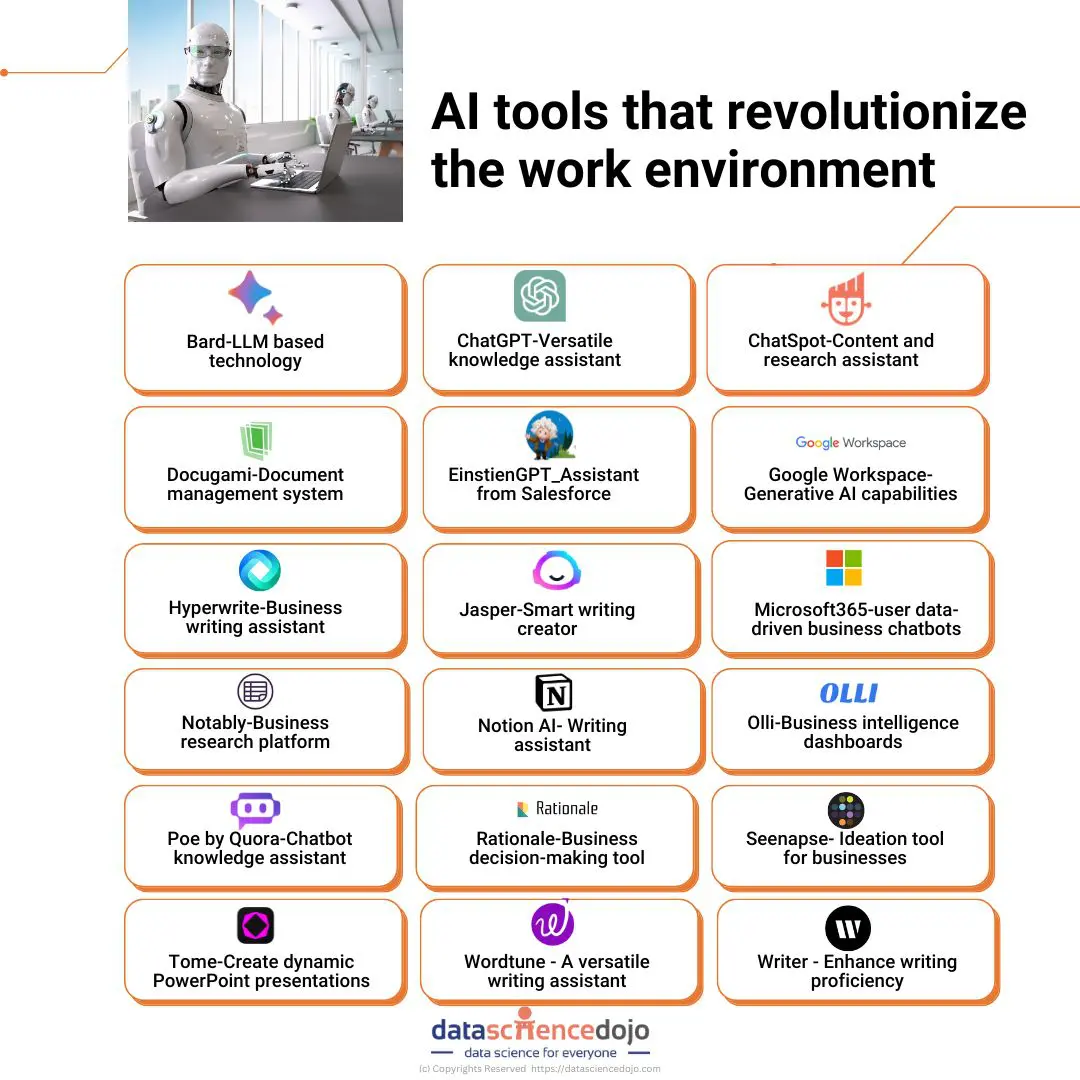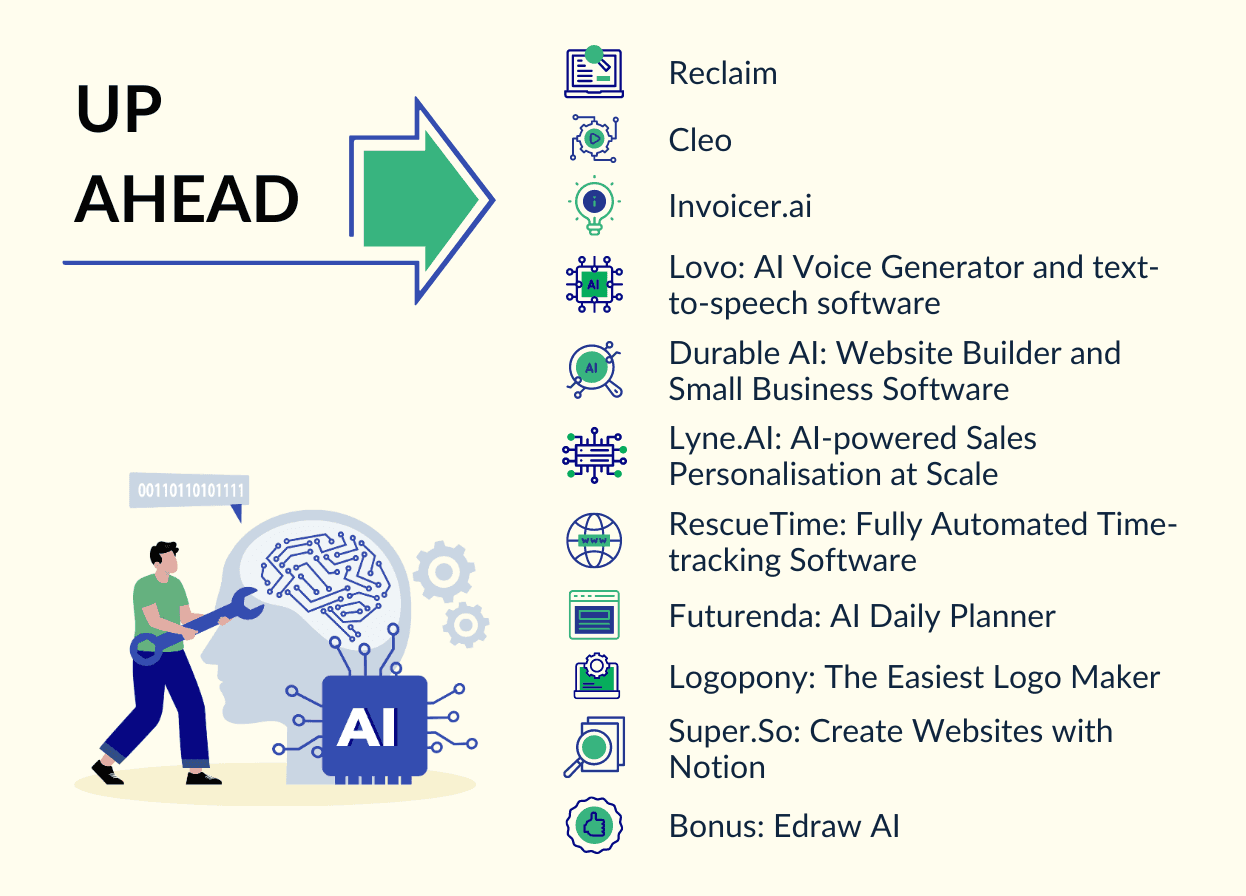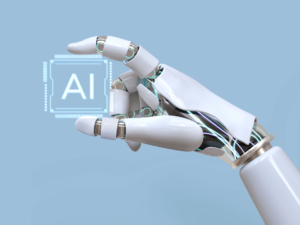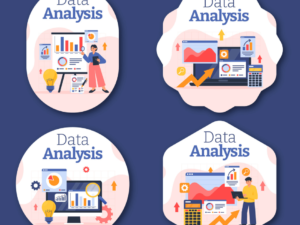AI Tools in Business, AI tools in business analyze data and automate decisions. They enhance efficiency and predictive capabilities.
AI has changed business by streamlining operations and driving innovation. These tools process huge amounts of data at unmatched speed. They let businesses gain once unattainable insights.
AI can automate routine tasks. This lets employees focus on more strategic work. It increases their productivity and creativity.
AI has many uses. They range from chatbots in customer service to predictive analytics in market trends. They are very effective. They improve efficiency and help create personalized customer experiences.
AI helps businesses predict trends and make data-driven decisions. It helps them stay competitive in a fast-changing market. The use of AI tools is a game changer. It marks a shift to more agile, smarter, customer-focused business models.
Table of Contents
The Evolution of AI in Business
The business world constantly evolves with technology. Artificial Intelligence (AI) stands out as a transformative force. It has reshaped how companies operate, make decisions, and interact with customers.
AI in business has evolved remarkably. It has moved from simple automation to complex problem-solving. Let’s explore this evolution further.
Early Adopters And Pioneers
Early AI adopters set the stage for widespread tech integration. They used AI for basic data analysis and automated customer service. These pioneers faced challenges like high costs and limited understanding of AI potential. Yet, their bold steps paved the way for today’s advanced applications.
Current Landscape And Trends
The AI landscape today is vibrant and dynamic. Businesses use AI for various tasks:
-
Predictive analytics to forecast trends
-
Chatbots for instant customer service
-
Automation to streamline operations
This integration has led to better decision-making and efficiency. The current trends point to even more sophisticated AI use. This includes machine learning models that self-improve over time. Companies are focusing on ethical AI and transparency to build user trust.
| Year | Trend | Impact |
|---|---|---|
| Early 2000s | Automation of Simple Tasks | Increased Efficiency |
| 2010s | Machine Learning Advancement | Enhanced Data Insights |
| 2020s | AI Ethics Focus | Greater User Trust |

Credit: datasciencedojo.com
Demystifying AI: What It Is And Isn’t
Artificial Intelligence, or AI, is a buzzword in the business world. It promises to revolutionize industries. Yet, there’s confusion about what AI truly is and what it’s not. It’s not magic or science fiction. It’s technology rooted in data and algorithms. Understanding the core technologies and separating myths from realities is key.
Core Technologies Behind AI
AI relies on specific technologies to function. These include machine learning, natural language processing, and robotics. Machine learning allows AI to learn from data. Natural language processing helps AI understand human language. Robotics enables AI to perform physical tasks.
- Machine Learning (ML): AI learns from large data sets.
- Natural Language Processing (NLP): AI interprets and generates human language.
- Robotics: AI interacts with the physical world.
Myths And Realities
Many myths surround AI, causing confusion and unrealistic expectations. Let’s debunk some common ones:
| Myth | Reality |
|---|---|
| AI can think like humans. | AI mimics certain human tasks but doesn’t possess consciousness. |
| AI works without human intervention. | Humans design, train, and maintain AI systems. |
| AI will replace all jobs. | AI may change job landscapes but also creates new roles. |
AI is not sentient. It operates within the scope programmed by humans. AI requires human oversight. Experts refine and guide AI systems. AI complements jobs. It handles tasks, allowing humans to focus on complex problems.
AI At Work: Practical Business Applications
Artificial Intelligence (AI) is transforming the business world. It makes tasks faster and smarter. Companies use AI to save time and money. Let’s dive into how AI helps in different business areas.
Streamlining Operations
AI systems boost efficiency. They handle data-heavy tasks with ease. This leaves more time for staff to focus on complex issues.
- Automated inventory management
- Smart scheduling tools for meetings
- Predictive maintenance for equipment
AI-driven analytics predict future trends. Businesses can plan better with this info.
Enhancing Customer Experience
Personalized interactions are key. AI tailors services to each customer. This creates a unique experience.
| Feature | Benefit |
|---|---|
| Chatbots | 24/7 customer service |
| AI recommendations | Custom product suggestions |
Feedback tools powered by AI gather customer opinions. This helps improve products and services.

Credit: www.skydo.com
AI Tools for Business Development
In business, AI tools for development are now essential. They help companies grow and innovate. These tools use AI to streamline processes, improve decisions, and boost customer engagement. They help businesses achieve their goals.
Key AI Tools for Enhancing Business Development:
- CRM Systems: AI CRMs like Salesforce and HubSpot use machine learning. They analyze customer data. They predict behaviors and tailor communication. This helps businesses target and nurture leads better.
- Predictive Analytics Tools: Tools like IBM Watson help businesses. They predict market trends and customer needs using historical data. This foresight lets companies tailor their strategies to meet expected demands. It gives them a competitive edge.
- Chatbots and Virtual Assistants: AI chatbots and virtual assistants provide round-the-clock customer service. They quickly handle inquiries and resolve issues. It boosts customer satisfaction. It also frees up staff for complex tasks.
Enhancing Strategy with AI Tools:
- Market Segmentation: AI tools analyze vast datasets to segment markets more precisely. It lets businesses tailor their products and services to each segment’s needs.
- Sales Optimization: AI in sales includes lead scoring and sales predictions. These tools help teams focus on the most promising leads.
Visual Element:
A chart showing how AI tools aid business development. It covers data gathering to strategy execution.
Practical Aspects:
- Integration: * It’s crucial to choose AI tools that integrate with existing systems. This avoids disruptions and leverages synergies. **Scalability**: Tools must scale with growth and adapt to changing needs.
Affiliate Links:
- Explore innovative AI tools for business development on Amazon.
- Secure your AI solutions with reliable hosting from Hostinger.
- Find cost-effective AI tools on AliExpress.
To explore AI’s potential, visit [HBR’s AI insight center](https://hbr.org/).
AI tools for business development. They improve efficiency and provide insights into the market and customers. This leads to better decisions and innovative strategies.
As these technologies evolve, they offer a chance for businesses. They can redefine their growth and establish a strong market position. Need to best AI tools for business development.
Data: The Fuel For AI Engines
Data: The Fuel for AI Engines plays a crucial role in business. AI tools need data to learn and make decisions. Think of AI as a car. Data is its fuel. Without quality data, AI can’t work well.
Importance of Quality Data
Good data lets AI do amazing things. It helps businesses in many ways. Here are a few:
- Make smart choices: AI uses data to help businesses decide.
- Understand customers: AI learns what customers like and dislike.
- Spot trends: AI notices patterns in data, predicting future trends.
Data Management Strategies
Managing data right is key. Here are tips for good data management:
- Collect wisely: Gather data that is useful. Avoid junk data.
- Keep it clean: Regularly check and fix data errors.
- Stay safe: Protect data from hackers and losses.
Using these strategies, businesses can fuel their AI tools well. This leads to better decisions and success.
Machine Learning: The Brain of AI
Machine Learning (ML) is the brain behind AI in business. It lets computers learn from data. This way, they make smart decisions without human help. ML is key for AI to work well in any business.
Supervised Vs. Unsupervised Learning
ML can be of two types: Supervised and Unsupervised Learning.
- Supervised Learning: Here, computers learn from examples. We give them data with answers. The goal is for them to learn and make predictions.
- Unsupervised Learning: In this, computers look at data without answers. They try to find patterns or groups on their own.
Predictive Analytics In Action
Predictive Analytics uses data to guess future events. It’s like a magic ball for businesses. With it, companies can see what might happen next. This helps them make better choices.
- Collect data from the past and present.
- Use ML to find patterns in this data.
- Make predictions about what could happen in the future.
Ai For Decision Making: From Data To Strategy
Businesses face countless decisions daily. Artificial Intelligence (AI) transforms this process. It turns data into actionable strategies. AI for decision making is pivotal for modern businesses.
Automating Routine Decisions
AI excels in automating decisions that are repetitive and predictable. By doing so, it saves time and reduces human error. Here’s how AI automates routine business decisions:
- Data Analysis: AI algorithms rapidly analyze vast datasets.
- Pattern Recognition: They identify trends and patterns in data.
- Decision Execution: Based on analysis, AI makes informed decisions.
- Continuous Learning: AI adapts by learning from past outcomes.
Supporting Complex Strategic Choices
Strategic decisions shape a company’s future. AI tools assist leaders in making these choices. They provide deep insights and predictive models. Here’s what AI does for strategic decision-making:
- Scenario Analysis: AI simulates different business scenarios.
- Risk Assessment: It evaluates potential risks in each scenario.
- Recommendation Systems: AI suggests optimal strategic options.
- Real-time Adjustments: AI responds to market changes swiftly.
Overcoming Challenges And Risks of AI Implementation
Implementing AI in business brings game-changing benefits. Yet, it also presents challenges and risks. Companies must navigate these carefully to reap AI’s rewards. Overcoming these hurdles is crucial for successful AI integration.
Addressing Ethical Concerns
AI ethics are a hot topic. Businesses must address these concerns head-on. Ethical AI use ensures trust and sustains customer relationships. Companies often establish ethical guidelines for AI. These include fairness, accountability, and transparency in AI operations.
- Develop fairness protocols to avoid bias.
- Create transparency measures in AI processes.
- Ensure accountability in AI decisions.
Ensuring Security And Privacy
Data is the fuel for AI. Protecting this data is vital. Security and privacy are top priorities in AI implementation. Strong security measures prevent data breaches. Privacy protection maintains customer trust.
| Security Measure | Benefit |
|---|---|
| Encryption | Secures data transmission |
| Access Control | Limits data reach |
| Regular Audits | Checks system integrity |
Companies must also comply with regulations like GDPR. Compliance shows commitment to user privacy.
- Adopt GDPR guidelines for data protection.
- Conduct privacy impact assessments.
- Inform users about data use.
Future Projections: AI’s Expanding Role In Business
The business world is on the brink of an AI revolution. Rapid advancements are positioning AI to transform industries. Let’s explore how future projections say an expanding role for AI in business.
Emerging Technologies and Innovations
Artificial Intelligence (AI) technologies are evolving at an unprecedented pace. Businesses are tapping into AI for growth and efficiency. Machine learning, natural language processing, and robotic automation are driving this change. These tools help companies make better decisions and improve customer experiences.
-
Machine learning algorithms predict market trends.
-
Chatbots enhance customer service.
-
Robotic Process Automation (RPA) streamlines operations.
Companies are investing in these technologies to stay competitive. They are also using AI to create new products and services. This leads to more innovation and better solutions for customers.
Preparing for the AI-driven future
Businesses must prepare for an AI-driven future. They need to invest in skills and infrastructure. We must understand AI’s potential and use it in our business strategies.
| Action | Benefit |
|---|---|
| Adopt AI technologies | Boost efficiency and innovation |
| Train employees on AI tools | Build an AI-savvy workforce |
| Develop AI strategies | Stay ahead of market trends |
Business leaders should focus on these areas for growth. They must embrace AI to keep up with the fast-paced market. The future belongs to those who innovate and adapt quickly. AI is not just a trend; it is the future of business.

Credit: www.nextinsurance.com
AI Marketing Tools: Revolutionizing Digital Strategies
AI marketing tools are changing digital marketing. They offer new ways to improve strategies, optimize customer interactions, and boost ROI.
These tools use AI to analyze consumer behavior and predict trends. They automate complex marketing tasks. This enables brands to deliver highly personalized marketing.
Core Functions of AI Marketing Tools:
- Customer Data Analysis: AI tools analyze customer data, like buying habits and web use.. It helps businesses know their audience and tailor marketing.
- Automated Content Creation: AI tools can automate content creation. They can draft personalized emails and create engaging social media posts. This ensures consistency and relevance across all digital channels.
- Campaign Optimization: AI can test different marketing strategies in real time. It identifies the best ones with speed. Tools like Google Ads use machine learning. It optimizes ad placements and bids. This maximizes the effectiveness of marketing campaigns.
Enhancing Customer Engagement:
- Personalized Recommendations: AI tools analyze customer preferences to suggest tailored products. This boosts customer engagement and satisfaction.
- Chatbots and Virtual Assistants: These AI tools provide 24/7 customer service. They handle inquiries and resolve issues instantly. This improves the customer experience and builds brand loyalty.
Visual Element: An infographic with key stats on AI marketing tools. It covers their impact on campaign success, customer engagement, and marketing ROI.
Integration and Scalability:
- It’s vital to choose AI marketing tools. They must integrate with existing CRM and ERP systems. This will ensure smooth operation and data consistency.
- Scalability is important. The tool must grow with your business. It should handle more data and complex campaigns without a hitch.
Affiliate Links:
- Explore leading AI marketing tools on Amazon.
- Secure robust hosting for your marketing platforms at Hostinger.
- Find innovative yet affordable marketing solutions on AliExpress.
For deep reviews of the best AI marketing tools, visit the Marketing AI Institute.
AI marketing tools automate boring tasks. They also help marketers make data-driven decisions. This can significantly enhance their campaigns.
As AI technology evolves, it could drive marketing innovation. It promises a future of more automated, personalized, and efficient marketing.
FAQ of How AI Tools Work in Business
What are AI tools in business?
AI tools in business refer to software systems that use artificial intelligence technologies. They automate tasks, analyze data, and improve decision-making in all business areas.
How do AI tools enhance productivity?
AI tools enhance productivity by automating routine tasks. They let employees focus on complex projects. This boosts efficiency and cuts time on repetitive work.
Can AI improve customer experiences?
Yes, AI can bring substantial enhancements to customer experiences. It personalizes interactions and provides quick chatbot responses. It also anticipates customer needs. This leads to higher satisfaction.
What is the role of AI in data analysis?
AI is vital in data analysis. It quickly processes large datasets and finds patterns. This leads to actionable insights that can drive strategic business decisions.
Conclusion on How AI Tools Work in Business
The piece “How AI Tools Work in Business: Unleash Potential” shows that AI tools are vital. They are key to pioneering modern business strategies. AI tools have revolutionized business operations.
They have changed how companies solve problems, interact with customers, and manage data. The tools turn vast data into actionable insights and strategic foresight.
AI tools use advanced algorithms and machine learning. They automate and optimize tasks that once needed humans. AI tools are transforming business efficiency and customer satisfaction.
They use predictive analytics to forecast trends and behaviors. They also use chatbots to improve customer service. These tools give a competitive edge. They let businesses operate faster, cut costs, and make better decisions.
The Impact on Various Business Sectors:
- Marketing: AI tools use consumer data to create personalized marketing campaigns. These campaigns boost engagement and conversion rates.
- Finance: AI improves accuracy in finance. It aids in risk assessment, fraud detection, and financial advice.
- Operations: Automating routine and complex tasks frees up people for more strategic work.. This optimizes productivity.
Visual Element: A flowchart showing how AI tools integrate into business systems. It highlights key actions from data collection to decision implementation.
Businesses using AI tools must know their ops’ needs and integration issues.
Consult various resources, including product reviews and user testimonials. They can provide insights into the strengths and weaknesses of different AI tools.
Readers can find many AI tools on Amazon. Hostinger has good hosting. AliExpress has cheap options.
In conclusion, AI in business is more than automation. It’s about using technology to create a space where innovation can thrive. As AI drives more business operations, its potential to transform industries grows.
Embracing this tech wave prepares businesses for the future. It also fosters continuous improvement and success in a fast-changing digital world.
Let’s harness this potential and propel our businesses into a smarter future.




